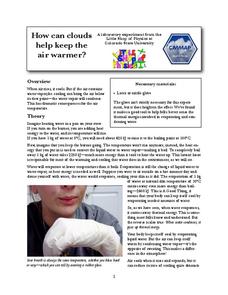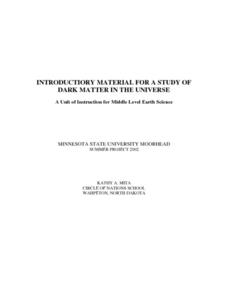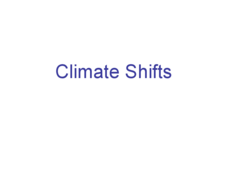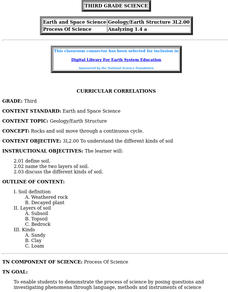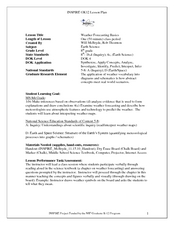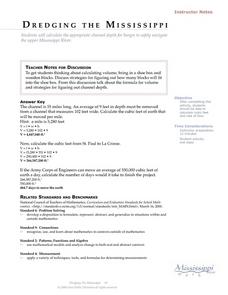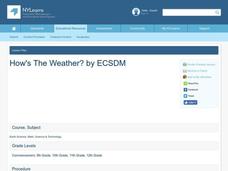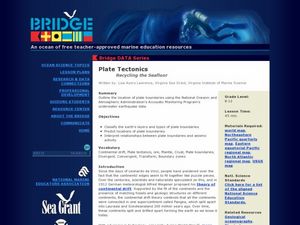Curated OER
Use Google Maps to Teach Math
Capture the engagement of young mathematicians with this upper-elementary math lesson on measuring time and distance. Using Google Maps, students first measure and compare the distance and time it takes to travel between different...
National Wildlife Federation
Why All the Wiggling on the Way Up? CO2 in the Atmosphere
The climate change debate, in the political arena, is currently a hot topic! Learners explore carbon dioxide levels in our atmosphere and what this means for the future in the 11th installment of 12. Through an analysis of carbon dioxide...
Laboratory for Atmospheric and Space Physics
Orbit Simulator
Researchers think they have evidence of a new planet deep in our solar system that is the size of Neptune and orbits the sun far beyond Pluto. The orbit simulator shows the orbits of our well-known planets, as well as Pluto and the comet...
Colorado State University
How Can Clouds Keep the Air Warmer?
Condensing water warms the air around it. Young scholars consider this concept as they experiment with air temperature around evaporating and condensing water vapor. They simulate the formation of clouds to experience the associated...
North American Montessori Center
Sun and Moon Autumnal Equinox Activities
Two hands-on activities celebrate the sun and moon autumnal equinox. First, scholars create a cairn using a shoebox, flashlight, and drawing tools to view the sun's progression. Second, learners take to the kitchen to bake mooncakes and...
Curated OER
Dark Matter In The Universe
Students investigate the concept of dark matter and how it occurs in the universe. They conduct research using a variety of resources. Students use the information by reading at least two articles about dark matter. They also generate...
Curated OER
Climate Shifts
Eight slides of information related to shifts in the climate make up this presentation. The vocabulary and concepts displayed are geared toward high school meteorology learners. Content is not cohesive from slide to slide, but the...
Curated OER
Curricular Correlations
An interesting lesson on different types of soils is here for you. In it, learners discuss what soil is, and consider three piles of soil - clay, sand, and loam. During the rest of the lesson, third graders discover all sorts of...
Curated OER
Ecosystems Lesson Plan
Students research ecosystems (rainforest, desert, grassland, woodland, and arctic tundra). Students compare the seven continents and the importance of proximaty to the equator.
Curated OER
Seasons Worksheet
Middle and high schoolers are given a diagram of the Earth rotating around the Sun. They label the seasons in the proper place, highlight special days such as the vernal equinox and autumnal equinox, the dates the special days fall on,...
Curated OER
Astronomy - Sun, Moon, Tides
Colorful in appearance, but without any photos or graphics, this PowerPoint is best used as a note-taking guide for your lecture. Viewers in your earth science class will discover characteristics and phases of the moon, its role in...
NASA
NASA
Everything you have ever wanted to know about our solar system, space exploration, and more can be found here. Be prepared to clear your schedule; you will be sucked into the app like a star into a black hole.
Montana State University
What's the Weather?
How many jackets do you need to stay warm and climb Mount Everest? An informatie resource covers the topic of Mount Everest, the resource helps young scientists discover the difference between climate and weather. Activities include...
Curated OER
Convergence with The Cay: Exploring Geographic Concepts Wrapped in a Story
Here's an awesome unit that uses The Cay as the anchor text. The 16-page packet is loaded with teaching ideas, activities, and suggested adjustments.
Curated OER
Geology and it’s Influence
Students compare current geological map and the one from 1800's. In this earth science lesson, students discuss differences between the two and explain the factors that caused the change. They write an essay about how these changes...
Curated OER
Weather Forecasting Basics
Eighth graders analyze weather diagrams and weather maps. In this earth science lesson, 8th graders explain why it is important to know the weather. They complete a handout at the end of the lesson.
Curated OER
Dredging the Mississippi
Students determine the amount of earth that needs to be removed from the Mississippi and the amount of time it takes the Army Corps of Engineers to complete a dredging project. Given specific dimensions of a channel, calculations are...
Curated OER
Earthquake Unit
Eighth graders watch the "Earth, the Environment & Beyond" video on earthquakes. Take notes and give an oral summary. They build a working, two dimensional model of a strike-slip, thrust, or normal fault.
Curated OER
What's Crackin' Under New Zealand
Students construct a model of the Earth using clay and oranges. In this earth science lesson, students explain the causes of earthquakes and volcanic activity. They write their findings in their science journal.
Curated OER
How's the Weather?
Young scholars explore earth science by researching the Internet. In this weather pattern lesson, students utilize the website weather.com to analyze the weather in different geographic locations. Young scholars view charts and graphs...
Curated OER
Plate Tectonics: Recycling the Seafloor
Pupils classify earth's layers and plates using Ocean Seismicity data. In this plate tectonics lesson, students outline where the plate boundaries are on the world map. They then compare these predicted boundaries with USGS map of the...
Curated OER
Creating a Disaster
Students construct a volcano model. In this earth science lesson, students determine the structure and build of their volcano. They explain the danger of volcanic eruptions.
Curated OER
The Flat Stanley Project
Learners read the book Flat Stanley. In this environmental stewardship lesson, students participate in earth-friendly activities based upon the book. This lesson includes ideas such as using recycled paper to make a "paper pal."
Curated OER
Volcanoes: Mount Vesuvius
Students explain how volcanoes form. In this earth science lesson, students identify the different types of volcanoes. They create brochures about Mt. Vesuvius before and after the eruption.
Other popular searches
- Earth Day Activities
- Earth Day Writing Activities
- Earth Day Art
- Earth Day Art Project
- Earth Day Writing
- Earth Day Lesson Plans
- Earth Day Lessons
- Earth Day Games
- Earth Day Unit Plan
- Earth Day Participation
- Earth Day Word Search
- Letters for Earth Day





